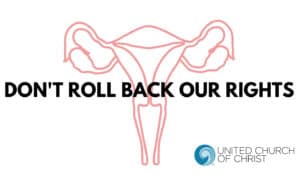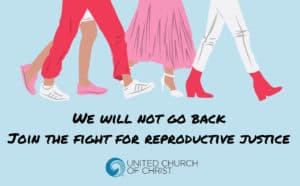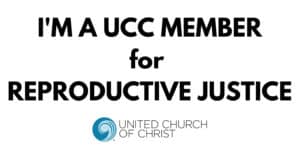CHHSM/JLCM Reproductive Justice Toolkits Offer Tangible Ways to Advocate for Women’s Rights

In the wake of the Supreme Court’s Dobbs decision overturning Roe v. Wade, the UCC’s Reproductive Justice Working Group has released a Reproductive Justice Messaging Toolkit, which includes five state-specific toolkits for areas with extreme or trigger laws that have been enacted following the Supreme Court decision. Key in the production of the toolkits has been the collaboration of the UCC’s Justice and Local Church Ministries (JLCM) and Council for Health and Human Service Ministries (CHHSM).
Working Group members the Rev. Dr. Elyse Berry and Essence Ellis of CHHSM worked with JLCM staff in Washington, D.C., with Ellis overseeing the compilation of the toolkits.
The toolkit — including its state-specific versions — is particularly important now, since the Supreme Court decision has focused advocacy for reproductive justice on state-level legislation.
“It is difficult to track state legislative activity, as it varies state by state, so the work of monitoring what happens in the states continues,” said Sandy Sorensen, director of JLCM’s Washington, D.C., office. “Inevitable legal battles will further complicate what is happening in the states.”
“The best source for advocates to find out when their state legislatures meet and to get legislative updates is by contacting state secretaries of state offices,” Sorensen added.

The Messaging Toolkit provides a vast array of tools local advocates can use in their work. It begins with an overview of reproductive justice and the United Church of Christ, both historically, and the recent UCC response to the Supreme Court’s decision in the Dobbs v. Jackson Women’s Health Organization case. It then delves into practical tools for advocates to use in answering attacks on reproductive healthcare access on state and federal levels. The kit includes sample Facebook and Twitter posts that can easily be adapted for use by local and regional advocacy groups.
For example, one sample Facebook post reads, “We will not let legislators continue to roll back our reproductive rights. Contact your legislators and urge them to protect reproductive rights.” The post ends with a link to an easy-to-use letter that anyone can send to their Congresspersons.
“I am beyond grateful for the work, insight and foresight that went into these toolkits,” said the Rev. Dr. Elyse Berry, CHHSM’s associate for advocacy and leadership development. “They came from a place of focused and thoughtful response, not a mere reaction to the SCOTUS decision after the fact. Essence Ellis and the JLCM team did a masterful job distilling the most useful information, directing folks to those who already have well-worn boots on the ground and support both action and reflection.”
The messaging toolkit also includes a series of social media graphics, helpful instructions on writing op-eds for media, and a reflective section on responding to challenging conversations. It emphasizes that conversations on reproductive justice can trigger emotional responses in many people, and gives common sense and compassionate guidelines for having such conversations.
State-Specific Legislative Kits Lay Groundwork

Five state specific legislative toolkits were compiled for Kentucky, Missouri, Oklahoma, Texas, and Wisconsin. Each legislative kit defines reproductive justice, discusses the current legislation in the state, includes link to social media and local advocacy groups, and provides personal engagement reflection activities and questions.
The five state toolkits were managed by CHHSM’s Ellis, who spent many hours cultivating networks of advocates in the five regions. While researching the information for the kits, Ellis laid the ground work for future action and advocacy in the various states. The development of networks of state-level advocates is essential for future work, said Sorensen.
“I think the most significant and impactful work that Essence did as UCC Fellow goes well beyond the toolkits to establishing the key relationships and networks for action and advocacy moving forward,” Sorensen said. “Given the SCOTUS decision, this type of relationship development and networks for action is exactly the work we need to continue moving forward. The work Essence did with us is a great blueprint for others wanting to engage in state work.”
Access the Reproductive Justice Messaging Toolkit, including the state-specific kits.
Join Our Mailing LIst
"*" indicates required fields
Follow on Facebook
Phoebe Berks Residents Take the Stage in First-Ever Talent Show - CHHSM
www.chhsm.org
Written by Alan Raisman & Dominic Trabosci; photos by Alan Raisman. The Phoebe Berks community in Wernersville, Pa. — part of Phoebe Ministries based in Allentown, Pa. — was in awe after watching ...